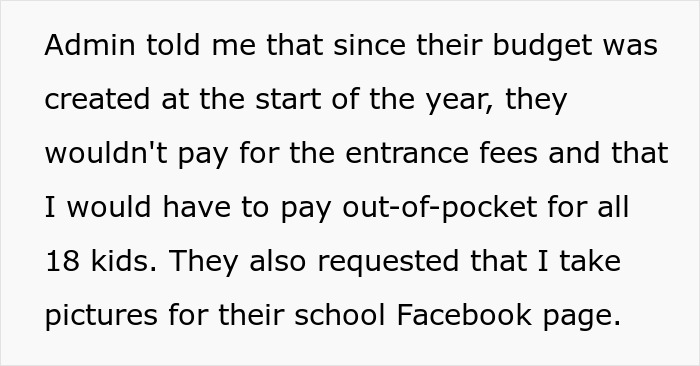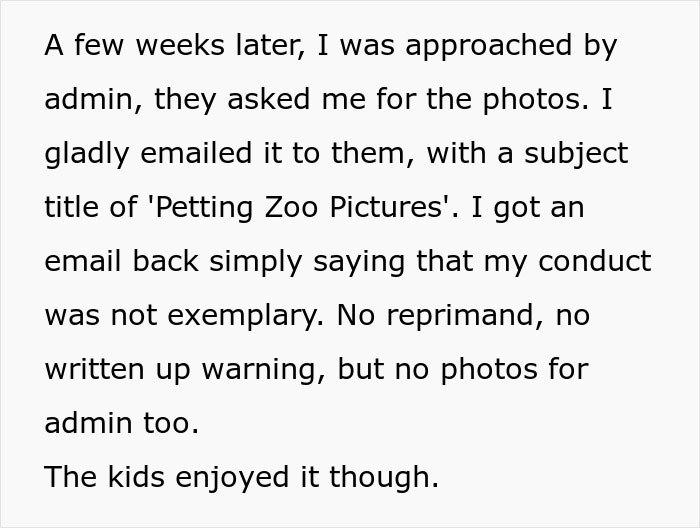Teacher Maliciously Complies When Told To Pay For Field Trip Out Of Pocket
Most people have had to deal with a boss, manager, or administrator who has made impossible or downright terrible demands. You can protest, quit, or try to argue, but oftentimes, the best way to get around it is to simply do as you are told and allow them to face the consequences.
A teacher maliciously complied with a school administration that wanted them to pay out of pocket for a field trip. The catch? The school also wanted photos to post on social media. Deciding that they weren’t going to fork over hundreds for a field trip, the teacher came up with a different plan.
An educator being expected to pay out of pocket for their pupils is generally unheard of
Image credits: Los Muertos Crew / pexels (not the actual photo)
A teacher came up with their own plan for a zoo field trip
Image credits: Karolina Grabowska / pexels (not the actual photo)
Image source: Unfunded_Teacher
Sometimes decision makers request things that are not actually feasible
Image credits: note thanun / unsplash (not the actual photo)
Malicious compliance remains one of the most effective means of allowing a decision maker to see that they are wrong. Unfortunately, it can be hard to show someone that they are wrong when they are further up the chain of command than you. Naturally, the option many people take is to simply go with it.
After all, unless, for example, you own a stake in the company, it’s not your responsibility what happens. So simply do as you are told and let management figure out what they did wrong. This also protects the person who is “maliciously complying” because, technically, they were doing exactly what they were told.
Sociologists actually see malicious compliance as an important form of “uncivil obedience.” After all, doing exactly as one is told is obedience, but it’s also possible to follow the “letter of the law” while totally ignoring its spirit. Interestingly, this story might get around this distinction because of the divergence of who or what actually is the “law.”
Malicious compliance can teach a lesson in the right circumstances
Image credits: Arthur Krijgsman / pexels (not the actual photo)
In most malicious compliance stories, the organization does something without fully understanding the consequences. However, OP is a teacher. A teacher’s job is, to the best of their abilities, to cover the curriculum assigned at the beginning of the year. So if they needed to go to a zoo, that’s exactly what happened.
The school administration wanted pictures, but as OP noted, was not willing to take any additional steps to get them. It’s important to note that “getting pictures for social media” is nowhere near a teacher’s job description, so, if anything, OP’s actions were of a rare “malicious overcompliance.”
The teacher managed the field trip and provided photos, all on their own dime. This was not out of some attempt to “get back at” an annoying person or overbearing administration, but simply a case of doing one’s job. Given the situation they were in, the teacher did an admirable job of limiting any possible hardship that may have come to the kids. After all, this field trip was for their education, so it’s good that they still had a fun time.
Hopefully, this can serve as a quality reminder for the administration that, if they want pictures, just like the zoo trip, there is going to have to be a budget and planning put in place for it to actually happen. Given that there was no harm actually done, OP’s story demonstrates a sort of best-case scenario for malicious compliance, where no one actually suffers, but a lesson is learned.
Readers were surprised at the school’s policy
[ad_2]
Most people have had to deal with a boss, manager, or administrator who has made impossible or downright terrible demands. You can protest, quit, or try to argue, but oftentimes, the best way to get around it is to simply do as you are told and allow them to face the consequences.
A teacher maliciously complied with a school administration that wanted them to pay out of pocket for a field trip. The catch? The school also wanted photos to post on social media. Deciding that they weren’t going to fork over hundreds for a field trip, the teacher came up with a different plan.
An educator being expected to pay out of pocket for their pupils is generally unheard of
Image credits: Los Muertos Crew / pexels (not the actual photo)
A teacher came up with their own plan for a zoo field trip
Image credits: Karolina Grabowska / pexels (not the actual photo)
Image source: Unfunded_Teacher
Sometimes decision makers request things that are not actually feasible
Image credits: note thanun / unsplash (not the actual photo)
Malicious compliance remains one of the most effective means of allowing a decision maker to see that they are wrong. Unfortunately, it can be hard to show someone that they are wrong when they are further up the chain of command than you. Naturally, the option many people take is to simply go with it.
After all, unless, for example, you own a stake in the company, it’s not your responsibility what happens. So simply do as you are told and let management figure out what they did wrong. This also protects the person who is “maliciously complying” because, technically, they were doing exactly what they were told.
Sociologists actually see malicious compliance as an important form of “uncivil obedience.” After all, doing exactly as one is told is obedience, but it’s also possible to follow the “letter of the law” while totally ignoring its spirit. Interestingly, this story might get around this distinction because of the divergence of who or what actually is the “law.”
Malicious compliance can teach a lesson in the right circumstances
Image credits: Arthur Krijgsman / pexels (not the actual photo)
In most malicious compliance stories, the organization does something without fully understanding the consequences. However, OP is a teacher. A teacher’s job is, to the best of their abilities, to cover the curriculum assigned at the beginning of the year. So if they needed to go to a zoo, that’s exactly what happened.
The school administration wanted pictures, but as OP noted, was not willing to take any additional steps to get them. It’s important to note that “getting pictures for social media” is nowhere near a teacher’s job description, so, if anything, OP’s actions were of a rare “malicious overcompliance.”
The teacher managed the field trip and provided photos, all on their own dime. This was not out of some attempt to “get back at” an annoying person or overbearing administration, but simply a case of doing one’s job. Given the situation they were in, the teacher did an admirable job of limiting any possible hardship that may have come to the kids. After all, this field trip was for their education, so it’s good that they still had a fun time.
Hopefully, this can serve as a quality reminder for the administration that, if they want pictures, just like the zoo trip, there is going to have to be a budget and planning put in place for it to actually happen. Given that there was no harm actually done, OP’s story demonstrates a sort of best-case scenario for malicious compliance, where no one actually suffers, but a lesson is learned.
Readers were surprised at the school’s policy
Read original article here










